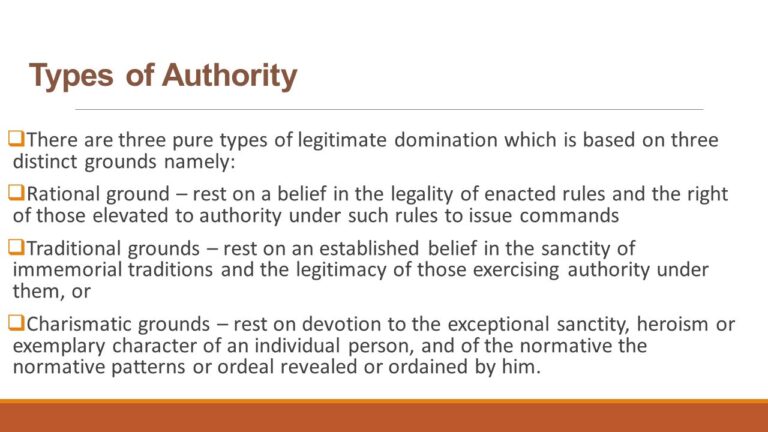
SOCIOLOGY UPSC – PAPER 1 – Sociological Thinkers : Max Weber- Social action, ideal types, authority, bureaucracy, protestant ethic and the spirit of capitalism.
AUTHORITY
- Weber’s concept of authority is a demonstration of his concept of ideal type.
- Power is defined by him as ‘the chance of a man or a number of men to realise their own will in a communal action even against the resistance of those who are participating in the communal action.
- Authorities a form of legitimate power.
- Coercion differentiates power from authority.
- Power is the capability of individuals to influence others irrespective of their wi

THREE IDEAL TYPES OF AUTHORITY
- Traditional Authority
Type of authority which stems out from traditional social actions.
Authorities based upon beliefs, customs and values.
Authorities exercised buy a hereditary monarch and a feudal lord are examples.
Such type of authorities are barriers to the development of a rationality. - Charismatic Authority
This is a result of personal qualities of the person who exercises it.
It corresponds to affective social action.
Authority exercised by Gandhi is an example.
Weber brands Charisma as a revolutionary force.
This type of authority becomes more pronounced in times of crisis and turmoil.
Such types of authority is inherently fragile.
Not as effective as legal-rational authority. - Legal-rational Authority
The authority is based on Zweckrational social action or total rational action.
Bureaucracy is considered the purest type of exercise of legal authority by Weber.
This form of authority leads to the most efficient systems.
CRITICISM
- He is criticized for the anomaly in ideal types of social action and ideal types of authority. There are four types of social action and only three types of authority.
- Michel Foucault has argued that authority and power don’t lie with particular institutions and persons but is highly dispersed in society.
- Robert Dahl state that authority is situational. One may be in a controlling position in one instance and may be controlled by others in another instance.
BUREAUCRACY
- Bureaucracy is the ideal type of organisation in which the structure is based on legal rational authority.
- This is a hierarchical organisation designed rationally to co-ordinate the work of many individuals in the pursuit of large-scale administrative tasks and organisational goals.
- Known for its stability and discipline.
- Weber conceived bureaucracy as structures and bureaucrats as positions within these structures.
ELEMENTS ASSOCIATED WITH BUREAUCRACY
- Bureaucracy works on the basis of written legal rational rules.
- Hierarchy of officials.
- Work is specialised.
- Bureaucrats are permanent and paid.
- Administrative acts, decisions and rules are formulated and recorded in writing.

WEBER’S SCEPTICISM ABOUT BUREAUCRACY
- A source of alienation of human being.
- Iron cage of rationality which makes human beings slaves of rationality.
- Bureaucratic life was a threat to individual liberty and creativity.
- Hardest institutions to destroy once they are established.
- Chance of dictatorship of officials.
CRITICISM
- Roberto Michels bureaucracy becomes so dominating in democracy that it reduces a democracy into an oligarchy.
- Reduces human beings as simply Cogs in the organisational machines.
- Concept of pure legal rational institutions are a Utopia.
- Flexible behaviour is needed in organisations to deal with uncertain events and bureaucracy does not offer the space for the same.

